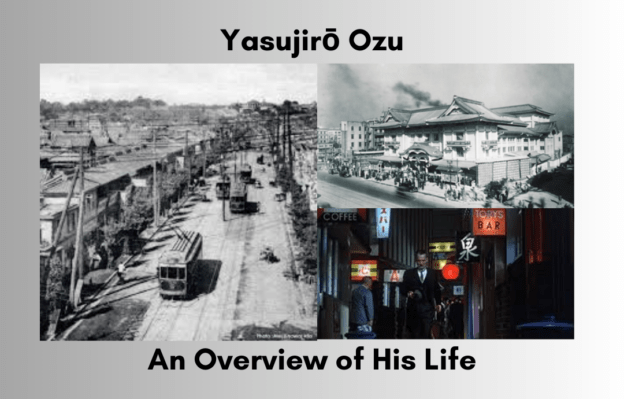The life of celebrated Director Yasujirō Ozu.
Yasujirō Ozu, born on December 12, 1903, in Tokyo, Japan, stands as one of the most celebrated directors in the realm of Japanese cinema. His films are cherished for their contemplative style, understated drama, and keen observations of everyday life. Here’s a brief overview of his life:
- Early Years: Ozu grew up in a well-off family, though his parents separated when he was young. He moved several times during his childhood, experiencing both urban and rural life. This diverse upbringing would later influence his nuanced portrayals of Japanese family life.
- Beginning in Film: Ozu started his cinematic journey as an assistant cameraman for Shochiku Studios in 1923. It wasn’t long before he directed his first film in 1927, marking the start of his illustrious directing career.
- Silent Film Era: Most of his early works were silent films, comprising comedies and student dramas. These initial years helped Ozu develop his distinct style, with films like “I Was Born, But…” (1932) showcasing his growing talent.
- World War II: During the war, Ozu was drafted into the army twice. The experiences he had and the places he visited (including China) would deeply influence his post-war films. It’s noteworthy that while other directors produced nationalistic films during the war, Ozu’s films largely steered clear of political propaganda.
- Post-war Masterpieces: After the war, Ozu’s works matured and he began producing what would become his most iconic films, delving deep into the changing dynamics of family life in post-war Japan. Films like “Late Spring” (1949) and “Tokyo Story” (1953) are considered masterpieces from this era.
- Later Years and Legacy: Towards the end of his career, Ozu started exploring color film, though he continued to maintain his unique style. “Equinox Flower” (1958) was his first colour film. His last film was “An Autumn Afternoon” (1962), a poignant reflection on ageing and change. Tragically, on his 60th birthday, December 12, 1963, Ozu passed away from throat cancer.
Throughout his career, Ozu was known for his dedication to his craft and his meticulous approach to filmmaking. Despite his films being deeply rooted in Japanese culture, the universal themes he explored, family, aging, modernity versus tradition, have ensured that his work remains relevant and beloved worldwide.
